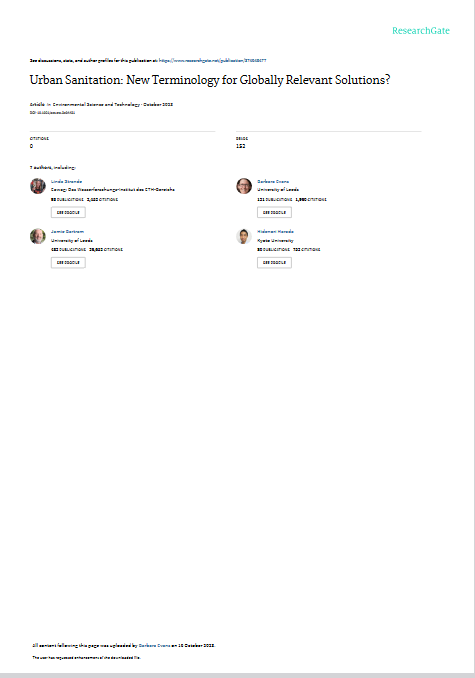Urban Sanitation: New Terminology for Globally Relevant Solutions?
 |
article Oct 2023 ; 10 pages
Aut. Linda Strande
Ed. Environmental Science and Technology -
Téléchargeable sous format: PdF
Abstract:
Progress toward Sustainable Development Goals for global access to safe sanitation is lagging significantly. In this Feature, we propose that misleading terminology leads to errors of categorization and hinders progress toward sanitation service provision in urban areas. Binary classifications such as “offsite/onsite” and “sewered/nonsewered” do not
capture the need for “transport to treatment” or the complexity of urban sanitation and should be discarded. “Fecal sludge management” is used only in the development context of low- or middle-income countries, implying separate solutions for “poor” or “southern” contexts, which is unhelpful. Terminology alone does not solve problems, but rather than using outdated or “special” terminology, we argue that a robust terminology that is globally relevant across low-, middle-, and upper-income contexts is required to overcome increasingly unhelpful assumptions and stereotypes. The use of accurate, technically robust vocabulary and definitions can improve decisions about management and selection of treatment, promote a circular economy, provide a basis for evidence-based science and technology research, and lead to critical shifts and transformations to set policy goals around truly safely managed sanitation. In this Feature, the three current modes of sanitation are defined, examples of misconceptions based on existing terminology are presented, and a new terminology for collection and conveyance is proposed: (I) fully road transported, (II) source-separated mixed transport, (III) mixed transport, and (IV) fully pipe transported.
Mot clef: |
Editeur/Diffuseur: |
|
En cas de lien brisé, nous le mentionner à communication@pseau.org